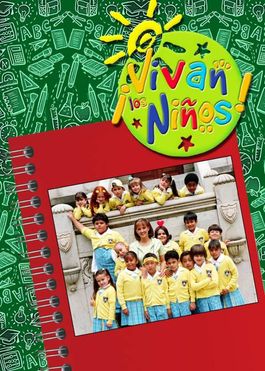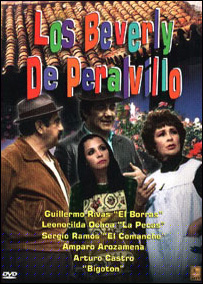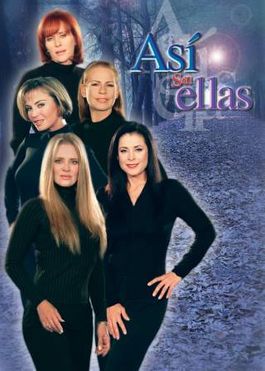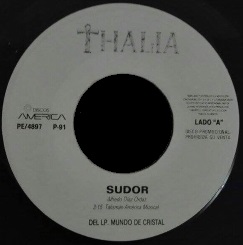Guillermo Rivas Rowlatt was a Mexican character actor known for portraying "El Borras" in the Telesistema Mexicano sitcom Los Beverly de Peralvillo (1968–1973).

Alcanzar una estrella is a Mexican telenovela first broadcast on Canal de las Estrellas in 1990. Also broadcast in Latin America and on Univision in the United States, the telenovela tells the story of an introverted girl's infatuation with her teen idol. The leading roles were played by singers Mariana Garza and Eduardo Capetillo, ex-members of the Mexican pop band Timbiriche. The two also sang the theme songs, which were written by Ricardo Arjona. Arjona and other singers such as Patricia Manterola also made acting cameos. The story was produced by Luis de Llano, producer and manager of Timbiriche and Garibaldi, and written by actress Rita Macedo, de Llano's mother. Alcanzar una estrella turned out to be Macedo's last credit as an actress before she committed suicide in the mid-1990s.

¡Vivan los niños! is a Mexican telenovela produced by Nicandro Díaz González for Televisa. It aired on Canal de las Estrellas from July 15, 2002, to March 17, 2003. It's an adaptation of the 1983 Argentinean telenovela Señorita maestra.

Thalía is the eponymous debut solo studio album by Mexican singer Thalía. It was produced by Alfredo Diaz Ordaz and released in Mexico on 9 October 1990, by Fonovisa Records. The album consisted of songs inspired in the 1980s rock, disco, pop, and ballads style. The first two singles "Un Pacto Entre Los Dos" and "Saliva" were highly controversial due to their suggestive lyrics, but were nonetheless highly successful, and are now considered Thalía's classics along with "Amarillo Azul" and "Pienso En Ti".

El diario de Daniela is a Mexican child telenovela produced by Rosy Ocampo for Televisa in 1998.

Marisol is a Mexican telenovela produced by Juan Osorio for Televisa in 1996. Telenovela is a remake of the 1977 Mexican telenovela Marcha nupcial. Famous and beloved Enrique Álvarez Félix died after he finished his work in Marisol.
Amparo Arozamena was a Mexican actress of film and television, best known for her character roles in the 1960s. During the same decade, she became most noted for her role of "Doña Chole" in the Telesistema Mexicano sitcom Los Beverly de Peralvillo (1968–1973). Arozamena had been acting since her early teens and had her first feature film released at the age of thirteen.
Alma rebelde is a Mexican telenovela produced by Nicandro Díaz González for Televisa in 1999. It is a remake of 1987 Mexican telenovela La indomable.

Vivo Por Elena is a Mexican telenovela produced by Juan Osorio for Televisa in 1998. The telenovela has been repeated several times on different channels since its original airing.

Los Beverly de Peralvillo is a 1971 Mexican comedy film directed by Fernando Cortés. The film is based on the television series of the same name.
Leonorilda Ochoa Pagaza was a Mexican actress and comedian who appeared in film since the Golden Age of Mexican cinema, television, and theatre productions. She became popular as La Pecas in the sitcom Los Beverly de Peralvillo (1968-1973).
Arturo Castro Rivas Cacho was a Mexican character actor who was often credited and nicknamed as "El Bigotón," due to his distinctive mustache.
¡Qué familia tan cotorra! is a 1973 Mexican comedy film directed by Fernando Cortés. It is the sequel to the film, Los Beverly de Peralvillo (1971).
Siempre te amaré is a Mexican telenovela produced by Juan Osorio for Televisa that premiered on Canal de Las Estrellas on January 24, 2000 and ended on July 28, 2000. It was adapted from the 1975 telenovela Lo imperdonable by Consuelo Garrido and Georgina Tinoco.

Así son ellas is a Mexican telenovela produced by Raúl Araiza for Televisa in 2002.

The fourth season of the Mexican sitcom Una familia de diez premiered on August 23, 2020 and concluded on October 4, 2020 on Las Estrellas. María Fernanda García returned to the series after being absent in the previous season. Patricia Martínez departed the series.

The fifth season of the Mexican sitcom Una familia de diez premiered on October 4, 2020 and concluded on November 15, 2020 on Las Estrellas. Production of the season began on September 18, 2020.

"Sudor" is a song by the Mexican singer Thalía released as the first single of her second album release Mundo de Cristal, in 1991. "Sudor" is the second of four songs in which Thalía talks about body fluids, the others are "Saliva", "Sangre" and "Lágrimas" from the albums Thalía, Love and En éxtasis, respectively.

Marissa Garrido Arozamena was a Mexican telenovela playwright and writer who was most active in the 1960s, 1970s and 1980s. She wrote forty-five adaptations and sixty-five original stories for television. Her most successful creation was La leona in 1961. The last telenovela she wrote was Besos prohibidos for TV Azteca in 1999. She was the sister of Mexican actress Amparo Garrido.












